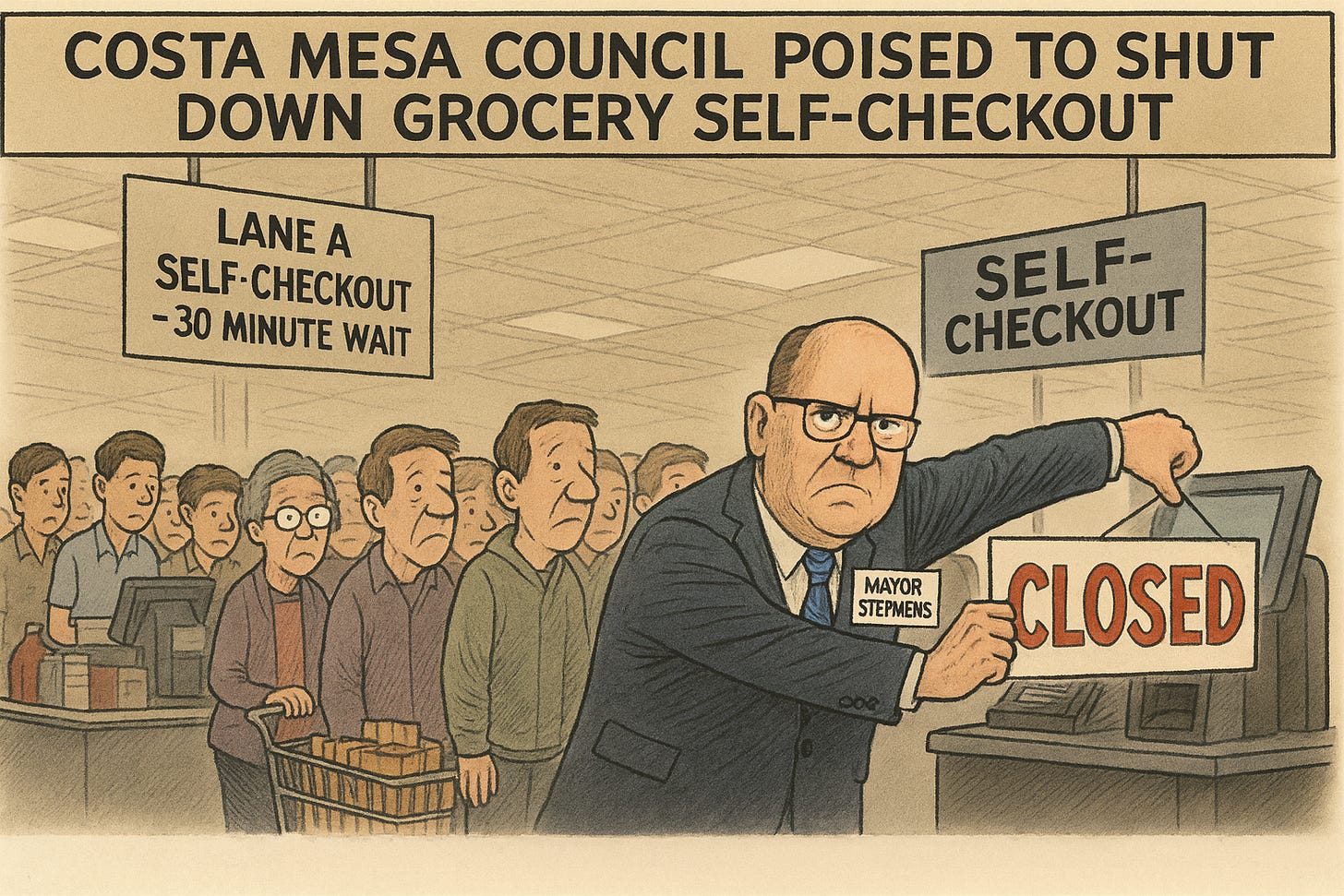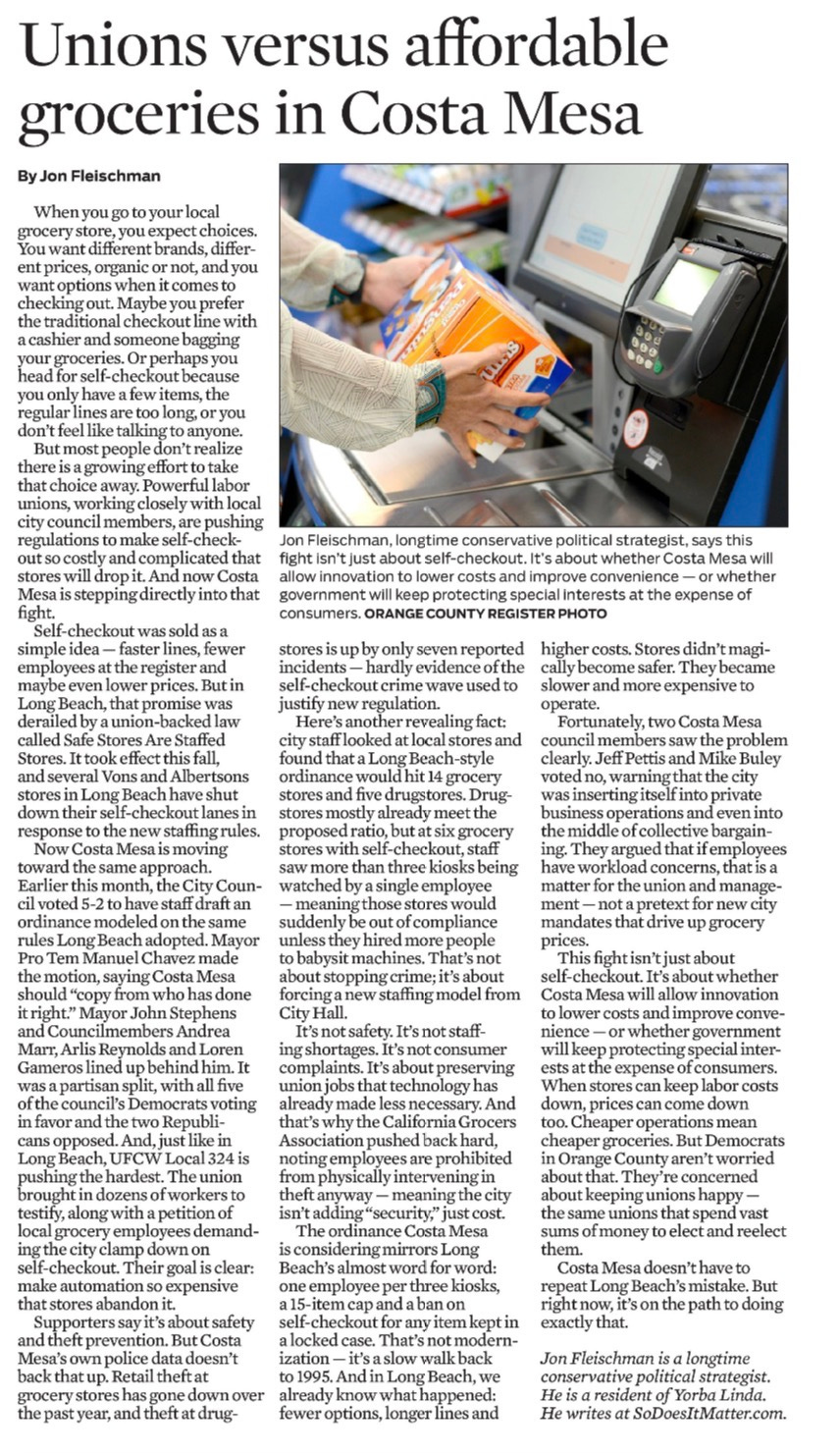Your grocery store, your choice — or maybe not for long in Costa Mesa
This column of mine ran today in the print edition of the Orange County Register. This happened in Long Beach, it's coming to Costa Mesa, and look for it to come to your city!
(Normally afternoon content is for our paid subscribers. But since this article is a re-print from my local paper, I figure sharing is caring. Plus I wasn’t going to post afternoon content today, except that this was already written! Have a great Thanksgiving Holiday! - Jon)
When you go to your local grocery store, you expect choices. You want different brands, different prices, organic or not, and you want options when it comes to checking out. Maybe you prefer the traditional checkout line with a cashier and someone bagging your groceries. Or perhaps you head for self-checkout because you only have a few items, the regular lines are too long, or you don’t feel like talking to anyone.
But most people don’t realize there is a growing effort to take that choice away. Powerful labor unions, working closely with local city council members, are pushing regulations to make self-checkout so costly and complicated that stores will drop it. And now Costa Mesa is stepping directly into that fight.
Self-checkout was sold as a simple idea — faster lines, fewer employees at the register, and maybe even lower prices. But in Long Beach, that promise was derailed by a union-backed law called Safe Stores Are Staffed Stores. It took effect this fall, and several Vons and Albertsons stores in Long Beach have shut down their self-checkout lanes in response to the new staffing rules.
Now, Costa Mesa is moving toward the same approach. Earlier this month, the City Council voted 5–2 to have staff draft an ordinance modeled on the same rules Long Beach adopted. Mayor Pro Tem Manuel Chavez made the motion, saying Costa Mesa should “copy from who has done it right.” Mayor John Stephens and Councilmembers Andrea Marr, Arlis Reynolds, and Loren Gameros lined up behind him. It was a partisan split, with all five of the council’s Democrats voting in favor and the two Republicans opposed. And, just like in Long Beach, UFCW Local 324 is pushing the hardest. The union brought in dozens of workers to testify, along with a petition of local grocery employees demanding that the city clamp down on self-checkout. Their goal is clear: make automation so expensive that stores abandon it.
Supporters say it’s about safety and theft prevention. But Costa Mesa’s own police data doesn’t back that up. Retail theft at grocery stores has gone down over the past year, and theft at drugstores is up by only seven reported incidents — hardly evidence of the self-checkout crime wave used to justify new regulation.
Here’s another revealing fact: city staff looked at local stores and found that a Long Beach–style ordinance would hit 14 grocery stores and five drugstores. Drugstores mostly already meet the proposed ratio, but at six grocery stores with self-checkout, staff saw more than three kiosks being watched by a single employee — meaning those stores would suddenly be out of compliance unless they hired more people to babysit machines. That’s not about stopping crime; it’s about forcing a new staffing model from City Hall.
It’s not safety. It’s not staffing shortages. It’s not consumer complaints. It’s about preserving union jobs that technology has already made less necessary. And that’s why the California Grocers Association pushed back hard, noting employees are prohibited from physically intervening in theft anyway — meaning the city isn’t adding “security,” just cost.
The ordinance Costa Mesa is considering mirrors Long Beach’s almost word-for-word: one employee per three kiosks, a 15-item cap, and a ban on self-checkout for any item kept in a locked case. That’s not modernization — it’s a slow walk back to 1995. And in Long Beach, we already know what happened: fewer options, longer lines, and higher costs. Stores didn’t magically become safer. They became slower and more expensive to operate.
Fortunately, two Costa Mesa councilmembers saw the problem clearly. Jeff Pettis and Mike Buley voted no, warning that the city was inserting itself into private business operations and even into the middle of collective bargaining. They argued that if employees have workload concerns, that is a matter for the union and management — not a pretext for new city mandates that drive up grocery prices.
This fight isn’t just about self-checkout. It’s about whether Costa Mesa will allow innovation to lower costs and improve convenience — or whether government will keep protecting special interests at the expense of consumers. Everyone knows we have an affordability problem in this county. Nowhere is that more evident than at the grocery store. When stores can keep labor costs down, prices can come down too. Cheaper operations mean cheaper groceries. But Democrats in Orange County aren’t worried about that. They’re concerned about keeping unions happy — the same unions that spend vast sums of money to elect and re-elect them.
Costa Mesa doesn’t have to repeat Long Beach’s mistake. But right now, they’re on the path to doing exactly that.
This column appears on the Orange County Register website here.





Great summary - I predicted this would happen once I saw the automation.
At my old grocery store chain in Massachusetts the company offered increased wages in exchange for self checkout lanes. Everyone was happy.
Existing employees got a raise and the store didn't backup with lines into the aisles. The self checkouts were all 15 items or less registers.